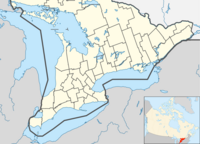Augusta, Ontario
| Augusta | |
|---|---|
| Township (lower-tier) | |
| Township of Augusta | |

North Augusta
|
|
| Coordinates: 44°45′N 75°36′W / 44.750°N 75.600°WCoordinates: 44°45′N 75°36′W / 44.750°N 75.600°W | |
| Country |
|
| Province |
|
| County | Leeds and Grenville |
| Government | |
| • Type | Township |
| • Reeve | Doug Malanka |
| • Federal riding | Leeds—Grenville |
| • Prov. riding | Leeds—Grenville |
| Area | |
| • Land | 314.73 km2 (121.52 sq mi) |
| Population (2011) | |
| • Total | 7,430 |
| • Density | 23.6/km2 (61/sq mi) |
| Time zone | EST (UTC-5) |
| • Summer (DST) | EDT (UTC-4) |
| Area code(s) | 613 |
| Website | www.augusta.ca |
Augusta Township is a township in the United Counties of Leeds and Grenville; located in eastern Ontario, Canada. Augusta is situated along the Saint Lawrence River, and extends back into rural hamlets. The township is located between the city of Brockville to the west, and the town of Prescott to the east.
The hamlets and villages within Augusta were established prior to the 1900s; primarily by the United Empire Loyalists. There are plenty of buildings and homes still standing in the township today that were built by early settlers; many of these historic homes are even still occupied by direct descendants of the first settlers.
In 2013, it was discovered that Samuel Bass, the Canadian abolitionist mentioned in Solomon Northup's 1853 memoir 12 Years a Slave, was from Augusta township. According to early census records, Bass was born in Augusta in 1807; while here, he married Lydia Catlin Lane, with whom he fathered four children. His wife and children remained in the area, and some of his descendants still reside here to this day. Bass' grandparents were among the first Loyalists to settle in the area, and his parents are buried at Maynard.
Augusta township is located within the St. Lawrence Lowlands region; its southern-most boundary is the shoreline of the St. Lawrence River. Much of the area is situated on top of large layers of limestone and grey sandstone, which formed between 500—75 million years ago during the Paleozoic era and the Ordovician period. There is not much known about the period directly following the Ordovician period except that there were long periods of erosion followed by marine invasions. The last glaciation occurred around one million years ago which was responsible for many of the present-day landscape features. During this glaciation the entire area of what would become Augusta was covered in a sheet of ice around two to three miles in thickness. This ice sheet melted around 12,000 years ago as a result of climatic changes. A few thousand years after it melted the Ottawa—St. Lawrence Valley was flooded by an arm of the Atlantic Ocean to a depth of around 400 feet (120 m); geologists refer to this flooding as the Champlain Sea. The retreat of the Champlain Sea around 9,500 years ago left excessive stone surfaces in many areas. The bedrock and boulder clay in the eastern portion of the township are covered by beds of sand which are likely glacial-fluvial in origin; before the forest could take root many dunes were formed just north of the town of Prescott. The area has many pockets of clay and peat around the banks of the South Nation River and the South Kemptville Creek.
...
Wikipedia

